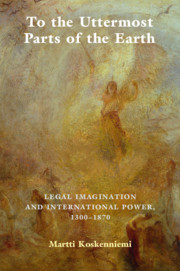Book contents
- To the Uttermost Parts of the Earth
- To the Uttermost Parts of the Earth
- Copyright page
- Dedication
- Contents
- Acknowledgements
- Introduction
- Part I Towards the Rule of Law
- Part II France: Law, Sovereignty and Revolution
- Part III Britain: Laws and Markets
- Part IV Germany: Law, Government, Freedom
- Bibliography
- Index
Introduction
Published online by Cambridge University Press: 05 August 2021
- To the Uttermost Parts of the Earth
- To the Uttermost Parts of the Earth
- Copyright page
- Dedication
- Contents
- Acknowledgements
- Introduction
- Part I Towards the Rule of Law
- Part II France: Law, Sovereignty and Revolution
- Part III Britain: Laws and Markets
- Part IV Germany: Law, Government, Freedom
- Bibliography
- Index
Summary
This is not a history of international law. Instead, it is a history of the legal imagination as it operates in relationship to the use of power in contexts that we would today call international. In an earlier work, I made the point that “modern” international law arose from an effort by a group of European lawyers in the last third of the nineteenth century to spread liberal legislation across Europe and to civilise the colonies. Although many readers reacted with sympathy to that account, they also remained puzzled about how to think about the earlier times – “But what about Vitoria, Grotius and Vattel, theories of the just war and the Peace of Westphalia?” This book is an extended response to that question. It is a history of the ways in which ambitious men, mostly in Europe, used the legal vocabularies available to them in order to react to important events in the surrounding world during the five earlier centuries. The book begins in France at around the year 1300 when a number of well-placed lawyers began to use the idioms of the Corpus iuris to consolidate the authority of their king at home and towards foreign rulers. The chapters then move on to Spain, France, Britain and Germany to expound the ways in which subsequent generations of theologians, courtiers, professors, legal and political men employed in addition to Roman law many other legal vocabularies to address the expansion of authority beyond their domestic world.
- Type
- Chapter
- Information
- To the Uttermost Parts of the EarthLegal Imagination and International Power 1300–1870, pp. 1 - 16Publisher: Cambridge University PressPrint publication year: 2021

